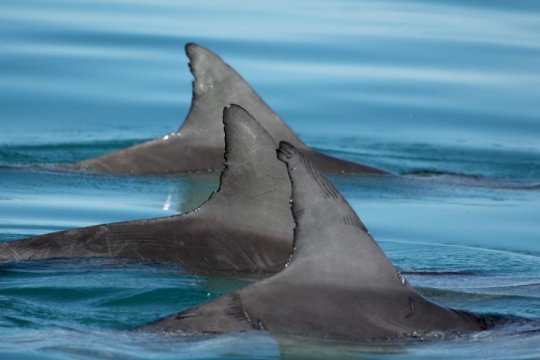[ad_1]
It’s not uncommon in dolphin society for males to form long-lasting alliances with other males, sometimes for decades. Now, after studying bottlenose dolphins in Shark Bay, Australia, for more than 30 years, researchers reporting in Current Biology on June 7 find that these males retain individual vocal labels rather than sharing a common call with their cooperative partners.
“We found that male bottlenose dolphins that form long-term cooperative partnerships or alliances with one another retain individual vocal labels, or ‘names,’ which allows them to recognize many different friends and rivals in their social network,” says Stephanie King (@_StephanieLKing) from the University of Western Australia. “Our work shows that these ‘names’ help males keep track of their many different relationships: who are their friends, who are their friend’s friends, and who are their competitors.”
In the new study, King and colleagues set out to better understand what role vocal communication plays in coordinating complex social behaviors, including cooperation, in bottlenose dolphins. The researchers knew from years of study that male bottlenose dolphins form long-term cooperative alliances with one another. However, they did not know how these males used vocal signals to form and maintain these relationships.
To explore the role of vocal signals, they recorded the dolphins’ vocalizations using underwater microphones and determined the individual vocal label used by each of the males. They then measured the similarity of those identity signals within and between alliances to find out whether males with stronger social relationships used vocal labels that were more similar.
“We wanted to understand if allied male dolphins converged onto similar calls as a way of advertising their alliance membership, or whether they retained individual vocal labels,” King explains.
The analysis showed that males in an alliance retain vocal labels that are quite distinct from one another, suggesting that those calls serve a purpose similar to an individual name. That’s in contrast to findings in many other species where individuals with close relationships converge on shared vocalizations as a way of advertising their membership to that partnership or group.
“With male bottlenose dolphins, it’s the opposite — each male retains a unique call, even though they develop incredibly strong bonds with one another,” King says. “Therefore, retaining individual ‘names’ is more important than sharing calls for male dolphins, allowing them to keep track of or maintain a fascinating social network of cooperative relationships.”
King says they will now study the males’ relationships with one another more closely. They’ll play the “names” of individual males back to each other and explore how males respond to members of their alliances in different contexts.
“It will be interesting to reveal whether all cooperative relationships within alliances are equal or not,” she says.
Story Source:
Materials provided by Cell Press. Note: Content may be edited for style and length.
[ad_2]















